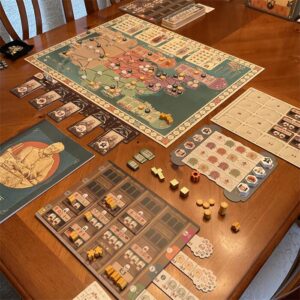Board games have been a source of entertainment and social interaction for centuries. In recent years, the board game industry has experienced a significant resurgence in popularity, with sales and interest reaching new heights. This renewed interest has led many entrepreneurs and aspiring business owners to consider board games as a potential venture. In this article, we will explore the reasons why board games can be a good business, examining the industry’s current state, market trends, potential challenges, and key factors for success.
The State of the Board Game Industry
The board game industry has experienced remarkable growth in recent years. This growth can be attributed to various factors, including the rise of crowdfunding platforms, the proliferation of board game cafes and bars, increased interest in tabletop gaming among millennials, and advancements in game design and production. The global board games market size reached US$ 13.4 Billion in 2021. Looking forward, the publisher expects the market to reach US$ 26.68 Billion by 2027, exhibiting a CAGR of 12.16% during 2021-2027.
Market Trends and Opportunities
Several trends contribute to the positive outlook for the board game industry. Firstly, there has been a shift in consumer preferences towards offline, social experiences. As people seek alternatives to digital entertainment, board games provide a unique opportunity for face-to-face interactions and shared experiences among friends and family. This trend is particularly evident among millennials and Generation Z, who value experiences over material possessions.
Furthermore, the industry has witnessed a surge in demand for niche and specialty board games. While classic games like Monopoly and Scrabble remain popular, there is an increasing appetite for innovative, immersive, and intellectually stimulating games. This demand has created opportunities for independent game designers and publishers to bring their unique creations to the market. Crowdfunding platforms like Kickstarter and Indiegogo have played a crucial role in enabling these creators to fund and produce their games, bypassing traditional publishing routes.
In addition to the physical board game market, the digital adaptation of board games has gained traction. Mobile apps, online platforms, and digital versions of popular board games allow players to engage in gaming experiences remotely and access a wider audience. This fusion of physical and digital formats has expanded the market reach and accessibility of board games, attracting both traditional board game enthusiasts and newcomers to the hobby.
Challenges and Considerations
While the board game industry offers significant opportunities, there are challenges that prospective entrepreneurs must consider. Competition is intense, with thousands of new board games being published each year. Standing out in a crowded market requires a unique selling proposition, compelling game mechanics, attractive artwork, and effective marketing strategies. Building brand awareness and establishing a loyal customer base can be time-consuming and challenging, especially for new entrants.
Production and distribution logistics can also present obstacles. Manufacturing board games requires careful planning, quality control, and efficient supply chain management. Moreover, the costs associated with production, including artwork, graphic design, prototyping, and manufacturing, can be substantial. Entrepreneurs must carefully budget and manage these expenses to ensure a viable business model.
Another consideration is the need for continuous innovation and game development. Board game enthusiasts are always on the lookout for new experiences and fresh gameplay mechanics. Staying ahead of the competition necessitates investing in research and development, playtesting, and iterating on game designs. A successful board game business must have a pipeline of engaging games to maintain customer interest and drive sales.
Success Factors for a Board Game Business
To thrive in the board game industry, several key factors contribute to success. First and foremost is creating compelling and high-quality games. Engaging gameplay, well-designed components, and appealing artwork are essential for attracting customers and building a loyal fan base. Investing in professional game design, graphic design, and artwork can significantly enhance the overall product experience.
A strong marketing and distribution strategy is equally vital. Establishing partnerships with distributors, retailers, and online platforms is crucial for reaching a broad customer base. Attending board game conventions, organizing demo events, and leveraging social media platforms are effective ways to generate buzz and drive sales. Additionally, fostering a vibrant community around the brand and games can contribute to word-of-mouth marketing and customer loyalty.
Providing excellent customer service and support is essential for building trust and fostering long-term relationships. Engaging with customers, addressing their concerns, and incorporating their feedback can lead to improved products and increased customer satisfaction. Furthermore, offering expansion packs, downloadable content, and organizing tournaments or organized play events can create additional revenue streams and increase customer engagement.
Conclusion
In conclusion, the board game industry offers a range of opportunities for aspiring entrepreneurs. With the market experiencing significant growth and the demand for unique and immersive gaming experiences on the rise, board games can be a profitable business venture. However, it is crucial to recognize the challenges associated with intense competition, production logistics, and the need for continuous innovation.
To succeed in the board game business, entrepreneurs must create compelling games, invest in high-quality production, develop effective marketing and distribution strategies, and provide excellent customer service. By staying attuned to market trends, adapting to changing consumer preferences, and fostering a passionate community, entrepreneurs can carve out a niche in this thriving industry. While the journey may be challenging, those who approach the board game business with dedication, creativity, and a customer-centric mindset have the potential to find success.








